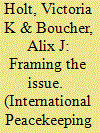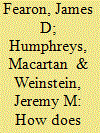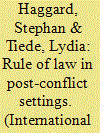|
|
|
Sort Order |
|
|
|
Items / Page
|
|
|
|
|
|
|
| Srl | Item |
| 1 |
ID:
086192


|
|
|
|
|
| Publication |
2009.
|
| Summary/Abstract |
This article examines the links between peace operations and combating transnational organized crime. It argues that while UN Security Council mandates direct UN missions to support establishing the rule of law in states that host peace operations, their role in addressing organized crime is more implicit than explicit. This article notes, however, that UN panels of experts, small fact-finding teams appointed to monitor targeted sanctions, may offer insight into, and options for addressing, such criminal networks. Panel findings and recommendations, however, are not integrated with related UN efforts to build the rule of law. This lack of integration reflects a need, on the part of the UN and its member states, to address better the ability of peace operations, UN panels of experts, and other tools for peacebuilding to contribute more effectively to fighting spoiler networks and organized crime.
|
|
|
|
|
|
|
|
|
|
|
|
|
|
|
|
| 2 |
ID:
140805


|
|
|
|
|
| Summary/Abstract |
Social cooperation is critical to a wide variety of political and economic outcomes. For this reason, international donors have embraced interventions designed to strengthen the ability of communities to solve collective-action problems, especially in post-conflict settings. We exploit the random assignment of a development program in Liberia to assess the effects of such interventions. Using a matching funds experiment we find evidence that these interventions can alter cooperation capacity. However, we observe effects only in communities in which, by design, both men and women faced the collective action challenge. Focusing on mechanisms, we find evidence that program effects worked through improvements in mobilization capacity that may have enhanced communities’ ability to coordinate to solve mixed gender problems. These gains did not operate in areas where only women took part in the matching funds experiment, possibly because they could rely on traditional institutions unaffected by the external intervention. The combined evidence suggests that the impact of donor interventions designed to enhance cooperation can depend critically on the kinds of social dilemmas that communities face, and the flexibility they have in determining who should solve them.
|
|
|
|
|
|
|
|
|
|
|
|
|
|
|
|
| 3 |
ID:
133655


|
|
|
|
|
| Publication |
2014.
|
| Summary/Abstract |
This paper analyzes whether and to what extent countries reconstitute the rule of law following civil conflict. Drawing on an original data set of 47 cases in which conflict ended between 1970 and 1999, we find that the cessation of conflict has at best a modest effect on the rule of law. On average, countries revert to the pre-conflict rule-of-law status quo ante. In simple models, rule of law prior to the onset of conflict is the best indicator of post-conflict performance. Analysis of individual cases using structural break analysis shows that the cessation of conflict is not typically associated with an inflection in the rule of law; improvements are modest, take a long time, and fall far short of plausible thresholds for robust rule of law.
|
|
|
|
|
|
|
|
|
|
|
|
|
|
|
|
|
|
|
|
|